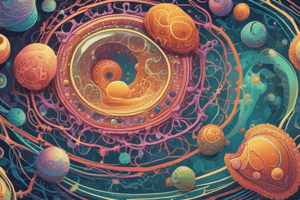Podcast
Questions and Answers
What is the primary function of the plasma membrane in a cell?
What is the primary function of the plasma membrane in a cell?
Regulating what enters and leaves the cell.
What is the role of mitochondria in a cell?
What is the role of mitochondria in a cell?
Generating energy for the cell through cellular respiration.
What is the main difference between prokaryotic and eukaryotic cells?
What is the main difference between prokaryotic and eukaryotic cells?
Prokaryotic cells lack a true nucleus, while eukaryotic cells have a true nucleus.
What is the process of cell division that results in four daughter cells with half the number of chromosomes as the parent cell?
What is the process of cell division that results in four daughter cells with half the number of chromosomes as the parent cell?
What type of transport involves the movement of molecules from an area of high concentration to an area of low concentration without energy input?
What type of transport involves the movement of molecules from an area of high concentration to an area of low concentration without energy input?
What is the role of lysosomes in a cell?
What is the role of lysosomes in a cell?
What is the function of the Golgi apparatus in a cell?
What is the function of the Golgi apparatus in a cell?
What is the term for the chemical reactions that occur within the cell to maintain homeostasis and sustain life?
What is the term for the chemical reactions that occur within the cell to maintain homeostasis and sustain life?
Flashcards are hidden until you start studying
Study Notes
Cell Structure
- Plasma membrane: semi-permeable membrane that surrounds the cell, regulating what enters and leaves
- Cytoplasm: jelly-like substance inside the cell where metabolic processes occur
- Nucleus: control center of the cell, containing DNA
- Mitochondria: organelles responsible for generating energy for the cell through cellular respiration
- Endoplasmic reticulum (ER): network of membranous tubules and cisternae involved in protein synthesis and transport
- Ribosomes: small organelles found throughout the cytoplasm, responsible for protein synthesis
- Lysosomes: membrane-bound sacs containing digestive enzymes, responsible for breaking down and recycling cellular waste and foreign substances
- Golgi apparatus: complex of flattened sacs and tubules involved in protein modification, sorting, and packaging
Cell Types
- Prokaryotic cells: lack a true nucleus, typically small and simple in structure (e.g., bacteria)
- Eukaryotic cells: have a true nucleus, typically larger and more complex in structure (e.g., plants, animals, fungi)
Cell Functions
- Metabolism: chemical reactions that occur within the cell to maintain homeostasis and sustain life
- Growth and development: cells grow, divide, and differentiate to form tissues and organs
- Response to stimuli: cells respond to changes in their environment, such as light, temperature, and touch
- Reproduction: cells divide to produce new cells, either through mitosis or meiosis
Cell Division
- Mitosis: process of cell division that results in two daughter cells with the same number of chromosomes as the parent cell
- Meiosis: process of cell division that results in four daughter cells with half the number of chromosomes as the parent cell, occurs in gamete production
Cellular Transport
- Passive transport: movement of molecules from an area of high concentration to an area of low concentration without energy input (e.g., diffusion, osmosis)
- Active transport: movement of molecules from an area of low concentration to an area of high concentration with energy input (e.g., carrier proteins, pumps)
Cell Structure
- Plasma membrane: regulates what enters and leaves the cell, semi-permeable
- Cytoplasm: jelly-like substance where metabolic processes occur, inside the cell
- Nucleus: control center, contains DNA
- Mitochondria: generate energy for the cell through cellular respiration
- Endoplasmic reticulum (ER): involved in protein synthesis and transport, network of membranous tubules and cisternae
- Ribosomes: responsible for protein synthesis, small organelles found throughout the cytoplasm
- Lysosomes: break down and recycle cellular waste and foreign substances, membrane-bound sacs containing digestive enzymes
- Golgi apparatus: involved in protein modification, sorting, and packaging, complex of flattened sacs and tubules
Cell Types
- Prokaryotic cells: lack true nucleus, small and simple in structure, e.g., bacteria
- Eukaryotic cells: have true nucleus, larger and more complex in structure, e.g., plants, animals, fungi
Cell Functions
- Metabolism: maintain homeostasis and sustain life, chemical reactions within the cell
- Growth and development: cells grow, divide, and differentiate to form tissues and organs
- Response to stimuli: cells respond to environmental changes, e.g., light, temperature, touch
- Reproduction: cells divide to produce new cells, either through mitosis or meiosis
Cell Division
- Mitosis: results in two daughter cells with the same number of chromosomes as the parent cell
- Meiosis: results in four daughter cells with half the number of chromosomes as the parent cell, occurs in gamete production
Cellular Transport
- Passive transport: movement of molecules from high to low concentration without energy input, e.g., diffusion, osmosis
- Active transport: movement of molecules from low to high concentration with energy input, e.g., carrier proteins, pumps
Studying That Suits You
Use AI to generate personalized quizzes and flashcards to suit your learning preferences.




